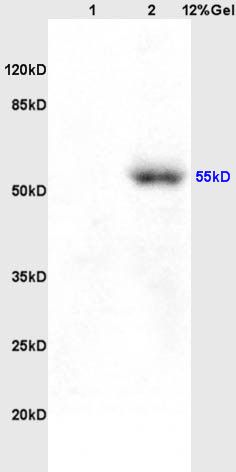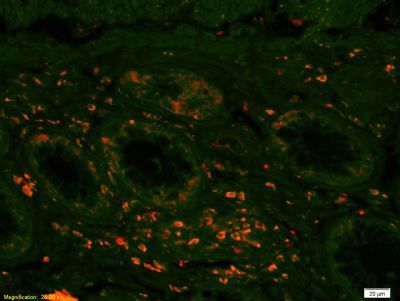This gene is a member of the immunoglobulin superfamily and encodes a protein which transmits an inhibitory signal to T cells. The protein contains a V domain, a transmembrane domain, and a cytoplasmic tail. Alternate transcriptional splice variants, encoding different isoforms, have been characterized. The membrane-bound isoform functions as a homodimer interconnected by a disulfide bond, while the soluble isoform functions as a monomer. Mutations in this gene have been associated with insulin-dependent diabetes mellitus, Graves disease, Hashimoto thyroiditis, celiac disease, systemic lupus erythematosus, thyroid-associated orbitopathy, and other autoimmune diseases. [provided by RefSeq, Jul 2008]
Function:
Inhibitory receptor acting as a major negative regulator of T-cell responses. The affinity of CTLA4 for its natural B7 family ligands, CD80 and CD86, is considerably stronger than the affinity of their cognate stimulatory coreceptor CD28.
Subunit:
Homodimer; disulfide-linked. Binds to CD80/B7-1 and CD86/B7.2.
Subcellular Location:
Cell membrane; Single-pass type I membrane protein. Note=Exists primarily an intracellular antigen whose surface expression is tightly regulated by restricted trafficking to the cell surface and rapid internalisation.
Tissue Specificity:
Widely expressed with highest levels in lymphoid tissues. Detected in activated T-cells where expression levels are 30- to 50-fold less than CD28, the stimulatory coreceptor, on the cell surface following activation.
Post-translational modifications:
N-glycosylation is important for dimerization.
Phosphorylation at Tyr-201 prevents binding to the AP-2 adapter complex, blocks endocytosis, and leads to retention of CTLA4 on the cell surface.
DISEASE:
Genetic variation in CTLA4 influences susceptibility to systemic lupus erythematosus (SLE) [MIM:152700]. SLE is a chronic, inflammatory and often febrile multisystemic disorder of connective tissue. It affects principally the skin, joints, kidneys and serosal membranes. SLE is thought to represent a failure of the regulatory mechanisms of the autoimmune system.
Note=Genetic variations in CTLA4 may influence susceptibility to Graves disease, an autoimmune disorder associated with overactivity of the thyroid gland and hyperthyroidism.
Genetic variation in CTLA4 is the cause of susceptibility to diabetes mellitus insulin-dependent type 12 (IDDM12) [MIM:601388]. A multifactorial disorder of glucose homeostasis that is characterized by susceptibility to ketoacidosis in the absence of insulin therapy. Clinical fetaures are polydipsia, polyphagia and polyuria which result from hyperglycemia-induced osmotic diuresis and secondary thirst. These derangements result in long-term complications that affect the eyes, kidneys, nerves, and blood vessels.
Similarity:
Contains 1 Ig-like SLVtype (immunoglobulin-like) domain.
SWISS:
P16410
Gene ID:
1493
Database links:
Entrez Gene: 1493 Human
Entrez Gene: 100505288 Mouse
Entrez Gene: 12477 Mouse
Entrez Gene: 63835 Rat
Omim: 123890 Human
SwissProt: P16410 Human
SwissProt: P09793 Mouse
Unigene: 247824 Human
Unigene: 390 Mouse
Unigene: 10259 Rat
CTLA4(细胞毒性T细胞抗原4),CTLA-4是位于T淋巴细胞膜上的跨膜免疫应答受体分子,CTLA-4对T淋巴细胞的活化具有负调控作用,有学者认为;CTLA-4可以参与免疫系统的功能,对肿瘤起到有效的抑制作用。
| Picture |
|
|
|


